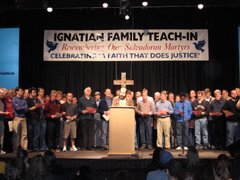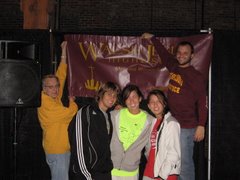In early February 2007, the Jesuit Commission for Social and International Ministries (JCSIM), issued a statement in response to the call from President Bush about increasing military personnel in Iraq. It calls for greater efforts at a diplomatic response to the increasing violence rather than an increased number of US military personnel.
The name of the document is: "An Invitation to Persons of Good Will to Support Intensified Diplomacy Rather Than an Escalation of Military Force in Iraq". It was edited several times and signed by 8 of 9 members on the commission.
The full text appears below and copies of the statement will be sent out to each Jesuit community in the province with an invitation to take part in the 'actions' listed at the end. As the
4th anniversary of the US led invasion comes upon us on 19 March 2007, let us remember all those who are in need of our prayers and our actions for increased diplomacy.
NOW is always the time to act for peace...* * * * * * *
Statement by the Jesuit Commission for Social and International Ministries (JCSIM)
February 2007
An Invitation to Persons of Good Will to Support Intensified Diplomacy
Rather Than an Escalation of Military Force in Iraq
Prior to the outset of the Iraq War, members of the faith community expressed grave moral concerns about military intervention in Iraq and questioned whether the full consequences of such a war had been properly considered. Indeed, Bishop Wilton Gregory, speaking as the then President of the United States Conference of Catholic Bishops, wrote:
“We join with Pope John Paul in the conviction that war is not ‘inevitable’ and that ‘war is always a defeat for humanity’…Our bishops’ conference continues to question the moral legitimacy of any preemptive, unilateral use of military force to overthrow the government of Iraq... Based on the facts that are known, it is difficult to justify resort to war against Iraq, lacking clear and adequate evidence of an imminent attack of a grave nature or Iraq’s involvement in the terrorist attacks of September 11. With the Holy See and many religious leaders throughout the world, we believe that resort to war would not meet the strict conditions in Catholic teaching for the use of military force.”
Given how prescient the moral concerns expressed by faith leaders proved to be, it is imperative that faith leaders speak out now as the President moves to increase the number of troops committed to the war in Iraq. We, the undersigned members of the Jesuit Commission on Social and International Ministry, join with the United States Conference of Catholic Bishops, the Conference of Major Superiors of Men (CMSM), the Leadership Conference of Women Religious (LCWR), and other persons of faith to express concern over this escalation in military force and to encourage our President and Congress to embrace a policy of broader diplomatic engagement that will not only seek to restore security, stability and reconstruction in Iraq, but also to end the Israeli-Palestinian conflict and prevent the return of civil war in Lebanon. The destabilization of Iraq, caused by the United States invasion and subsequent management of the ensuing conflict, has added to the already complex tensions existing in the region. This makes it all the more imperative that the United States make a concerted diplomatic effort to engage all the governments in the Middle East in a common effort to find solutions to the tensions that now threaten to engulf the entire region in a conflagration with unimaginable consequences.
Already, the Iraq war has had devastating consequences:The Iraqi Health Ministry reports that in 2006,
22,950 Iraqi civilians and police officers died violent deaths. In the first six months of last year, 5,640 Iraqi civilians and police officers were killed, but that number more than tripled to 17,310 in the latter half of the year.
Last year’s spike in casualties occurred despite an ambitious U.S. military operation in the capital, “Together Forward,” that involved thousands of U.S. and Iraqi troops cordoning off some of the deadliest neighborhoods in Baghdad and conducting house-to-house searches.
More than
3,000 members of the United States armed forces have died in the Iraq conflict with more than 20,000 soldiers injured since the start of the Iraq war.
The conflicts in Iraq and Afghanistan are now costing the United States government approximately
$8 billion a month, $3,000 per second. This is in addition to the Defense Budget that in the last fiscal year was $463 billion dollars, or approximately $14,000 per second. There are calls now for increasing the size of the United States armed forces due to the strain experienced in fighting the wars in Iraq and Afghanistan. If approved, this increase will result in a further escalation in Pentagon spending. Defense spending, and the cost of military operations places real constraints on the ability of the United States to respond to the pressing social needs of the United States. It also limits the humanitarian and development assistance the United States is able to provide to other nations which would serve to stabilize nations and regions.
The U.N. High Commissioner for Refugees believes that
1.7 million Iraqis are displaced inside Iraq, whose prewar population was 21 million. The U.N. also reports that roughly 40 percent of Iraq’s middle class is believed to have fled the country; this in the wake of violence that has cost the lives of at least 2,000 Iraqi doctors since the U.S. invasion in 2003. The flight has undermined basic services such as water and sanitation and disrupted commerce, making it increasingly difficult for Iraqi society to function. Neighboring countries are being overwhelmed by the influx of Iraqi refugees. Iraqi refugees now account for 10 percent of the population of Jordan, a nation of only 6 million persons – the equivalent of 30 million landing on U.S. shores. The U.S. has been sluggish in its response to this crisis allowing only 466 Iraqis to immigrate under refugee status since 2003 and allocating only $20 million for Iraqi refugee assistance.
It is clear that the United States needs to engage with the international community, particularly all the nations which share borders with Iraq, in creating a process that would end the endemic violence in Iraq, reduce sectarian tensions, mobilize humanitarian relief and reconstruction aid, train Iraqi security forces, and allow for the phased withdrawal of United States combat forces.
We call upon all people of faith, all people of good will, to do the following:To declare one Sabbath day each month as a day of prayer and fasting for a peaceful resolution to the conflict in Iraq, to acknowledge and begin to redress the suffering and violence endured daily by the Iraqi people, to remember the members of our armed forces who serve, and have served, in Iraq, and to petition that God grant comfort and peace to all who have lost loved ones in this conflict.
To write to President Bush and Secretary of State Condoleezza Rice asking them to engage the international community in a united effort to find a path to peace in Iraq and to exclude no nation from this effort. We ask them, as well, to work with the international community in resolving the Israeli-Palestinian conflict as well as in forestalling a renewed civil war in Lebanon.
To write to their representatives in Congress calling upon them to press the administration to engage in a broad, diplomatic effort to address not only the conflict in Iraq, but the conflicts now threatening the wider Middle East. We ask Congress, as well, to oppose the escalation of the conflict and to seek the means by which a phased withdrawal of forces can happen sooner rather than later.
The Iraq War has proven the truth that ‘war is a defeat for humanity.’ The human cost of this war has been devastating and that devastation continues daily. It is time for the United States to recognize that a change in course in Iraq is required; not an increase in troops and attendant violence, but an increase in diplomatic efforts to engage all parties in the region in helping the Iraqi people to live together in peace.
Signed:
Mary Baudouin
Assistant for Social Ministries
New Orleans Province
Kevin Cullen, S.J.
Assistant for Social and International Ministries
Missouri Province
Mark Hallinan, S.J.
Assistant for Social Ministries
New York Province
Timothy Kelly
Assistant for Social and International Ministries
Maryland Province
Carrie Monnette
Assistant for Social and International Ministries
Detroit Province
Mark Potter
Assistant for Social Ministries
California Province
John Sealey
Assistant for Social and International Ministries
Wisconsin Province
William Watson, S.J.
Special Assistant for International Ministries
Oregon Province
Contacts to express your position:
The Honorable George W. Bush
President of the United States
The White House
Washington, DC 20500
202-456-1111 (comment line)
202-456-2461 (fax)
president@whitehouse.govThe Honorable Condoleezza Rice
Secretary of State
Department of State
2201 C Street NW
Washington DC 20520
202-647-6575
202-647-2283 (fax)
http://www.state.gov/Links to congressional representatives
202-224-3121 (Capitol Switchboard)
http://www.house.gov/http://www.sentate.gov/
















